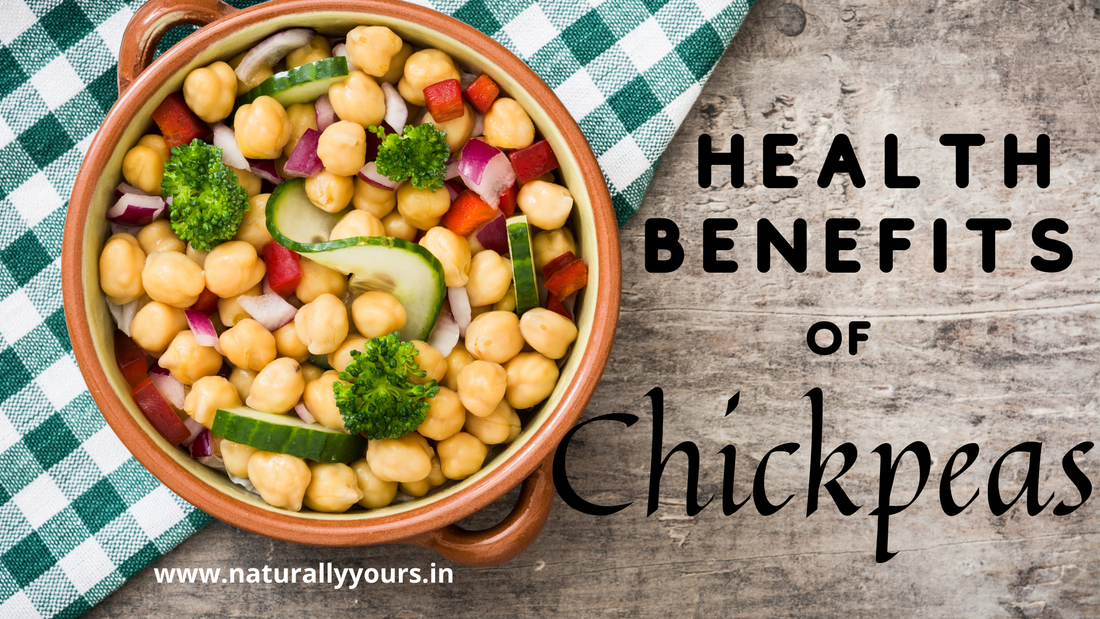
10 Amazing health benefits of Chickpeas
Naturally YoursShare

Chickpeas, which belong to the legume family, have been a part of middle eastern, Mediterranean and Indian cuisine since thousands of years. There are two main varieties of chickpeas - kabuli and desi. Desi chickpeas are small and dark. Kabuli are large and beige-colored with a thin skin.
Chickpea are a great source of plant based proteins. They are also high in vitamins, minerals and dietary fiber. Being naturally high in fiber and proteins, it has a number of health benefits such as weight management, blood sugar control and improves digestive health.
Nutritional profile:
According to a study (1) published in NCBI, the nutritional profile of 100g cooked chickpea is as below:
Calories : 164Kcal
Protein : 8.86g
Fat : 2.59g
Carbohydrate : 27.42g
Fiber : 7.6g
Calcium : 49mg
Magnesium : 48mg
Phosphorous : 168mg
Folate : 172mcg
This low calories and high protein superfood is also a great alternative to refined flour which has zero nutrients. Hence companies like Naturally Yours have developed nutritious gluten free pasta made of chickpea. So that, even when you are enjoying a delicious bowl of pasta, you do not have to compromise on the health factor.
Health benefits of chickpea
1. Healthy weight management
Being rich in dietary fiber and proteins, chickpea keeps you full for a longer period of time. This results in reduced appetite and lower calorie intake which essentially helps in weight management.
2. Blood sugar control
Chickpea have a low glycemic index of 28. It slows the carbohydrate absorption and prevents sudden spike in blood sugar, making it a good choice for diabetics. The high fiber content also helps to prevent inflammation in individuals suffering from Type I diabetes.
3. Aids in digestion
The fiber content in chickpeas includes both soluble as well as insoluble fiber. The soluble fiber forms a gel like substance in the digestive track which promotes the growth of good gut bacteria thereby supporting healthy digestion. The insoluble fiber helps in regular bowel movements and thus prevents constipation.
4. Helps to prevent osteoporosis
Chickpea is a good source of calcium, magnesium and potassium; all of which are highly essential for strong bones. It also has the lowest level of phytates among all beans and lentils. Phytates can interfere with the body’s ability to absorb calcium. Since chickpeas are soaked before cooking, this step further reduces the phytate levels in it.
5. Cardiovascular health
The magnesium and potassium content in chickpea helps to maintain healthy blood pressure levels in the body. The soluble fiber also helps to reduce LDL or blood cholesterol levels. Both these are known risk factors of heart diseases.
6. Cancer prevention
Chickpea has a number of cancer fighting entities such as saponins, selenium, folate and beta carotenes. All these have been known to reduce the risk of developing cancerous growth in breast, lung and colon. Consumption of chickpeas also promotes the production of butyrate, which is known to reduce cell proliferation and induce apoptosis which in turn may reduce the risk of colon cancer.
7. Helps to combat anemia
Chickpeas are rich in iron, folate and vitamin C, all of which are essential for the synthesis of haemoglobin. Adequate levels of vitamin C are required for the body to absorb iron. Hence chickpeas make a valuable addition in the diet especially for pregnant women or menopausal women who are at higher risk of being anemic.
8. Reduces menopausal symptoms
The fluctuations of hormones particularly the decline in estrogen, is the cause of many menopause complaints. Chickpeas are a good source of phytoestrogen, which basically are plant compound that are capable of binding to estrogen receptors and can replace some of the effects of estrogen that is no longer being made. Regular consumption of chickpea thus helps in reducing menopausal symptoms like hot flashes and vaginal dryness.
9. Healthy skin and hair
Nutrients like Manganese, zinc, Vitamins A and B in chickpeas help to reduce wrinkles and age spots. They also help to reduce hair fall and fight dandruff. Applying a mask made by mixing chickpea flour (besan), turmeric powder and water on your face for 15 mins and then washing it off can bring a lovely glow.
10. Supports pregnancy
Chickpea is a rich source of folate, which is highly essential for pregnant women. It helps in the baby’s development and prevents neural tube defects. The recommended daily intake of folate for pregnant women is 400mcg. Chickpea contains 172mcg per 100g.
How to use: Apart from the all time favorite chole masala, chickpeas can be used in salads, hummus and also as a roasted snack. It can be ground into flour and used as a thickener in gravies or to make crunchy pakodas.
A simple recipe: Hummus
Take 1 cup of cooked chickpeas, 2 Tbsp of water, 2 Tbsp olive oil, 1Tbsp lemon juice, 1 garlic clove, 1 Tsp cumin powder, and 1/4 teaspoon of salt. Blend together until smooth and creamy. Do a taste test and add more salt if required. Sprinkle some chilli flakes and parsley (optional). Serve as a healthy dip with pita bread, chips, carrot sticks etc.
Reference
- The Nutritional Value and Health Benefits of Chickpeas and Hummushttps://www.ncbi.nlm.nih.gov/pmc/articles/PMC5188421/
